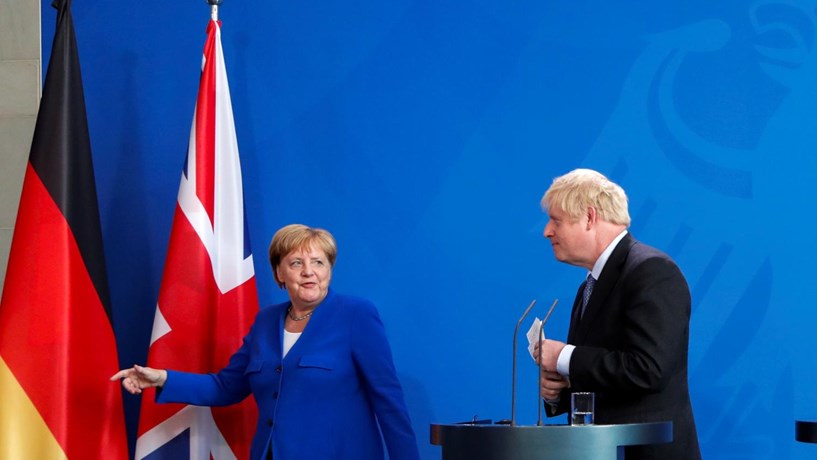The British Prime Minister was “more than pleased” with the 30 days the German Chancellor gave the United Kingdom to present an alternative proposal to the Irish border safeguard mechanism. At the end of the meeting between Merkel and Johnson, the burden remained on the British side.
More time to find a solution to the biggest obstacle to approving the exit agreement. This was the meager outcome of the meeting between German Chancellor Angela Merkel and new British Prime Minister Boris Johnson.
After the first personal conversation with the UK Eurosceptic Prime Minister, Merkel kept the burden on the British side, giving London 30 days to resolve the Brexit process “dilemma” and come up with an alternative plan within the deadline. called backstop.
Welcomed in Berlin by protesters shouting “STOP Brexit”, Boris Jonhson arrived at the press conference following the meeting with Merkel saying there was “ample margin” to reach an agreement to leave the European Union. Johnson was still “more than pleased” with the “intense” schedule set by the chancellor.
However, the British ruler, who does not give up on consummating Brexit on the date now scheduled for 31 October, reiterated that a British exit from the legally framed European bloc can only happen if Brussels drops the backstop mechanism to avoid reinstatement. strict controls at the Irish border. This scenario is rejected by Brussels and in particular by Ireland.
“[The backstop] simply has to fall,” the conservative shot, asserting that if it did, the conditions would be met to “make progress very quickly” towards a final deal.
Although soon in the first speech to the House of Commons as British Prime Minister, Johnson committed himself to a Brexit on October 31 “without yes or no”, thus giving strength to an unsettled exit scenario, now the Conservative politician stressed that the UK’s main goal is to reach an agreement with the European partners.
Merkel Insists on Changes to Political Statement
The chancellor recovered an idea already expressed on other occasions in the long deadlock over Brexit. Given the unavailability of European leaders to reopen the negotiation of the agreed exit agreement with former Prime Minister Theresa May, which has already failed three times in the British Parliament, Merkel suggests amendments to the political statement agreed between London and Brussels, which also has to be approved by the British MPs.
According to Angela Merkel, the solution for the backstop, which is demanded by Brussels and rejected by London, can be achieved with changes to the document setting out the guiding principles for the future relationship between the two blocs, notably by providing additional assurances that the Kingdom The United Kingdom would not be indefinitely “bound” to single market rules. This hypothesis has already been suggested at other times but has always deserved the refusal of the Eurosceptic wing of the Conservative Party, which elected Johnson leader of the “Tories”.
Boris Johnson, who rejected talks with Merkel and the French president until Brussels gave up the backstop, is meeting in Paris with Emmanuel Macron on Thursday. This Wednesday, an official Elisha source quoted by Bloomberg noted that Paris is already preparing the future based on a disorderly British exit from the EU. European Council President Donald Tusk, with whom Johnson meets Sunday on the sidelines of the G20, stressed that Brussels did not relinquish the backstop and called on London “realistic alternative proposals”.
So far, Boris Johnson, in the image of the British Parliament, has made clear what he does not want but has not yet achieved what he wants.

